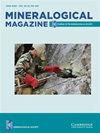捷克波西米亚地块花岗伟晶岩中巴文石-波士石的矿物组合及成分变化
IF 1.4
3区 地球科学
Q2 MINERALOGY
引用次数: 1
摘要
摘要研究了捷克共和国波希米亚地块15个花岗伟晶岩中的辉橄榄岩-辉橄榄岩的共生作用和成分。在与原生Be前体、矿物组合、形态和起源的关系上,识别出三种不同的类型:(1)在残余伟晶岩流体的泥质岩洞穴中结晶的原生热液辉橄榄岩-波西米亚岩;和二次方辉橄榄岩-波西米亚岩,分为两种不同的类型:(2)近端类型,在空间上局限于原生Be矿物之后的假形态(绿柱石>苯钠石,海尔文-丹纳利特);和(3)寄主伟晶岩脆性断裂和裂隙上的远端型。矿物组合变化很大:(1)轴石-(Mn)、蒙脱石、方解石和黄铁矿;(2) 白榴石、milarite、次生绿柱石、巴兹矿、钾长石、白云母-伊利石、方镁石、钙石、方沸石、绿泥石;以及(3)白云母、钠长石、石英、绿帘石、钙矾石-(Mg)、钙矾土-(Fe3+)、钛矿和绿泥石。电子探针分析显示,除了主要成分(Si、Ca和Al)外,Na(≤0.24)、Fe(≤0.10)、Mn(≤0.10,苯钠铝石和海尔文-达纳石(分别为1.56–0.46、0.70–0.05、1.02–0.35 apfu);以及3型远辉石-波西米亚石,通常在绿柱石之后(1.63–0.09 apfu)。拉曼光谱显示,OH–振动模式之间的距离随着波西铁矿成分的增加而减小。第二类2近端辉橄榄岩-辉橄榄岩的Al含量由Be前体的组成控制,而以绿柱石为Be前质的第三类远端辉橄榄岩–辉橄榄岩则变化更大,其组成主要由流体的组成控制。钙是巴韦尼特-波西铁矿起源的关键成分,来源于残余伟晶岩流体(VlastŞjovice、Vepice IV或TřebíčPlutons)或外部来源(如Drahonín IV、VŞžnáI或Maršíkov)。来自泥质岩穴的初级1型水热bavenite–bohseite可能在T≈300–400°C和P≈200 MPa时结晶,而次级2型和3型bavenite-Bohseitte则在T≈300–100°C和P≈200–20 MPa时形成。本文章由计算机程序翻译,如有差异,请以英文原文为准。
Mineral assemblages and compositional variations in bavenite–bohseite from granitic pegmatites of the Bohemian Massif, Czech Republic
Abstract The paragenesis and composition of bavenite–bohseite were investigated in fifteen granitic pegmatites from the Bohemian Massif, Czech Republic. Three types distinct in their relation to primary Be precursors, mineral assemblages, morphology and origin were recognised: (1) primary hydrothermal bavenite–bohseite crystallised in miarolitic pockets from residual pegmatite fluids; and secondary bavenite–bohseite in two distinct types: (2) a proximal type restricted spatially to pseudomorphs after a primary Be mineral (beryl > phenakite, helvine–danalite); and (3) a distal type on brittle fractures and fissures of host pegmatite. The mineral assemblages are highly variable: (1) axinite-(Mn), smectite, calcite and pyrite; (2) bertrandite, milarite, secondary beryl, bazzite, K-feldspar, muscovite–illite, scolecite, gismondine-Ca, analcime, chlorite; and (3) muscovite, albite, quartz, epidote, pumpellyite-(Mg), pumpellyite-(Fe3+), titanite and chlorite. Electron microprobe analyses showed, in addition to major constituents (Si, Ca and Al), minor concentrations (in apfu) of Na (≤0.24), Fe (≤0.10), Mn (≤0.10) and F (≤0.36). The type 1 hydrothermal miarolitic bavenite–bohseite is mostly Al-rich (2.00–0.67 apfu) relative to type 2 proximal bavenite–bohseite and bohseite after beryl, phenakite and helvine–danalite (1.56–0.46, 0.70–0.05, 1.02–0.35 apfu, respectively); and type 3 distal bavenite–bohseite typically after beryl (1.63–0.09 apfu). Raman spectroscopy revealed that the distance between the OH– vibrational modes decreases with increasing bohseite component. The Al content of secondary type 2 proximal bavenite–bohseite is controlled by the composition of the Be precursor whereas type 3 distal bavenite–bohseite with beryl as the Be precursor is more variable and the composition is governed mainly by the composition of fluids. Calcium, a crucial component for bavenite–bohseite origins, was derived from residual pegmatite fluids (Vlastějovice, Vepice IV or Třebíč Plutons) or external sources (e.g. Drahonín IV, Věžná I or Maršíkov). Primary type 1 hydrothermal bavenite–bohseite from miarolitic pockets might have crystallised at T ≈ 300–400°C and P ≈ 200 MPa, whereas the secondary type 2 and 3 bavenite–bohseite formed at T ≈ 300–100°C and P ≈ 200–20 MPa.
求助全文
通过发布文献求助,成功后即可免费获取论文全文。
去求助
来源期刊

Mineralogical Magazine
地学-矿物学
CiteScore
4.00
自引率
25.90%
发文量
104
审稿时长
6-12 weeks
期刊介绍:
Mineralogical Magazine is an international journal of mineral sciences which covers the fields of mineralogy, crystallography, geochemistry, petrology, environmental geology and economic geology. The journal has been published continuously since the founding of the Mineralogical Society of Great Britain and Ireland in 1876 and is a leading journal in its field.
 求助内容:
求助内容: 应助结果提醒方式:
应助结果提醒方式:


